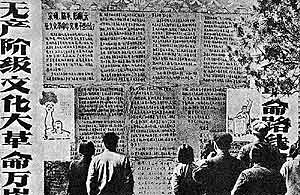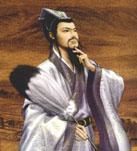
The Communist Party of China is big on anniversaries. When I visited Bejing in 1999, half the city was locked down after 7pm to allow dress rehearsals for the PRC's golden jubilee. China's tumultous history for the first half of the 20th century provides lots of nation-building material - the May Fourth Movement, the Nanchang Uprising, the Liberation itself - all suitably commemorated with flag-waving children, goosestepping soldiers and overdecorated floats.
After 1949, the anniversaries stop. So this Thursday is likely to pass quietly, notwithstanding that it marks forty years to the day when a Peking University lecturer kicked off the Cultural Revolution. Nie Yuanzi was a radical forty-five year old when she stuck up her 'big character poster' denouncing the university authorities. She's now a pensionless eighty-five year old who shares a borrowed apartment with her pet cats and her memories, sharpened by seventeen years in prison; a victim of the monster she helped unleash.

Nie Yuanzi's dazibao
China must have a dialogue about the Cultural Revolution, says Nie, who was one of the Five Leading Red Guards but fell from grace when the political winds shifted in 1968. The reason is less therapeutic than prescriptive, to avoid a repeat catastrophe springing from a flawed understanding of history. One gets the impression that those scarred personally are past the need for reconciliation; the scattered but growing number of voices calling for a national debate talk about the future, as much as the past.
Certainly the responses one gets from people who lived through the "Ten Years of Chaos" remain laconic, even casual. Like a tutor of mine recounting how as a child she watched her father (a university lecturer) paraded through the streets in a dunce cap past baying mobs. Or a friend's father making off-hand references to his years as a teenage 'barefoot doctor' in one of the hundreds of rural counties that the Red Guard generation was exiled to from 1969, in an attempt to expiate the madness.
Certainly the responses one gets from people who lived through the "Ten Years of Chaos" remain laconic, even casual. Like a tutor of mine recounting how as a child she watched her father (a university lecturer) paraded through the streets in a dunce cap past baying mobs. Or a friend's father making off-hand references to his years as a teenage 'barefoot doctor' in one of the hundreds of rural counties that the Red Guard generation was exiled to from 1969, in an attempt to expiate the madness.
On top of the human cost, there's a need to confront the most comprehensive effort yet seen to destroy a nation's cultural heritage. I remember admiring the coffin of an Empress at the Ming tombs outside Beijing, complete with an apologetic sign explaining that it's a replica, the original having received the attention of axe-wielding Red Guards during the swinging sixties. Left-leaning western college students may still find the mass mobilisation and ideological fervour inspiring; Chinese intellectuals view it the same way that cultured Germans view the Nazi rallies at Munich.
But within China itself, the subject remains taboo. As far as the Party's concerned the matter was closed on June 27, 1981, with the Central Committee resolution pinning the blame on Chairman Mao and the counterrevolutionary clique behind him. Nie's is one of the few voices to penerate the blanket of censorship that still lies across the country, smothering even the one private museum dedicated to the Cultural Revolution.

The Cultural Revolution Museum outside Shantou
The root problem is that reevaluating the Cultural Revolution means reevaluating the role of Mao Zedong - and by extension that of the Communist Party - in the nation's history. China has yet to go through an equivalent of Russia's de-Stalinisation process. Instead the verdict on the Great Helmsman remains frozen in Deng Xiaoping's 70-30 formula: 70 per cent right, 30 per cent wrong. An honest discussion about the historical black hole from 1966-76 would open a political pandora's box, one that the Party has tried to keep shut with the weight of economic growth.
So this is just another instance of the CCP's propensity to sweep its problems under the carpet of history, if necessary by waiting for the main protagonists to die. Last year saw the exit of both Zhao Ziyang and Zhang Chunqiao, the last survivor of the Gang of Four. Neither the baggage of the Cultural Revolution nor that from the June 4th Incident seems to have impeded China's headlong rush to modernity; one of Zhao's proteges has even made it to Premier, while the memorabilia of Mao's personality cult now furnishes trendy cafes. But faced with the mounting contradictions of marketisation within the framework of a Party-State, China's leaders may eventually find that the cherished goal of national stability requires them to use history as a mirror, a lesson they readily dispense to China's neighbours.
As was observed about another national cataclysm, one that festered for a hundred years after the violence ceased:
"The past isn't dead. It's not even past".
Addendum
In case anyone's wondering about the slogan on the title picture:
"The Chinese People's Liberation Army is the Great School of Mao Zedong Thought"

1 comment:
meanwhile, the good times keep rolling...
Post a Comment